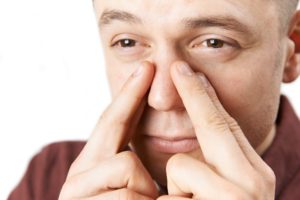
Symptoms of chronic rhinosinusitis include facial pain, headache, reduced ability to smell, and nasal obstruction.
Chronic rhinosinusitis has long been associated with a poor quality of life along with problems associated with social, environmental, physical, and cognitive functioning. Depression and anxiety often accompany chronic rhinosinusitis, but it is unclear if they are present before or after chronic rhinosinusitis diagnosis.
The study looked at 16,224 South Korean patients who were treated for chronic rhinosinusitis over 11 years. These patients were compared to 32,448 controls. All participants had no history of depression or anxiety.
Study author Dr. Dong-Kyu Kim explained, “Despite receiving optimal medical and surgical treatment, some patients with chronic rhinosinusitis have repeated, persistent symptoms, which make this condition challenging to manage.”
Those with worsened mental health problems “usually show significantly worse pain and energy levels, as well as difficulty with daily activities, than do patients . . . Without mental health problems,” Dr. Kim added.
Patients with sinus problems and nasal polyps were 41 percent more likely to suffer from depression after sinus diagnosis and 45 more likely to suffer from anxiety.
Those with chronic rhinosinusitis without polyps had a 61 and 63 percent higher risk of depression and anxiety respectively.
The study didn’t prove that chronic rhinosinusitis causes depression and anxiety. The researchers did lack information about the patient’s alcohol and smoking status, which could play a role in mental health problems as well. It is possible that inflammation in chronic rhinosinusitis could release certain neurotransmitters that can affect the brain and increase the risk of depression and anxiety.
Although the study cannot determine cause and effect, it is still important to recognize that there is a potential link between sinus issues and mental health, and doctors should look out for depressive or anxiety symptoms among their patients who suffer from chronic rhinosinusitis.